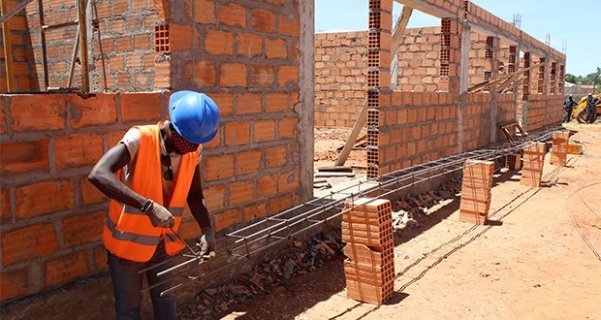In a press conference, the Working Group for Transparency and Truth in the Recovery and Reuse of Recovered Assets summarized the results of six months of monitoring social infrastructures, under construction, with the reuse of money recovered in the asset recovery process through PIIM.
The report, with 62 pages, discloses information about some ongoing projects, highlighting four, three developed in the province of Luanda and one in Benguela.
Regarding the project being developed in Benguela, south coast of Angola, João Malavindele, executive director of OMUNGA, focused on the construction of a police station, costing 33 million kwanzas and lasting three months, but which has not yet ended despite a financial execution above 60 percent.
João Malavindele said that during the research they verified that both the contractor and the construction inspector do not have a physical structure in the municipality of Lobito, also highlighting that the administration was not available to inform whether a public tender had been held.
"The conclusion we reached is that there was no public tender and, if there was, this information should have been available. The work is valued at 33 million kwanzas (...), but we concluded that the amount allocated to this work is very large compared to the type of work", he said.
According to João Malanvidele, the report also concluded that "there are companies that are created just to be part of these processes, to win projects", because many of them do not have a "construction history", with work having been paralyzed for a year due to lack of capacity contractor's finances.
"These issues lead us to question the issue of transparency in the processes for awarding PIIM projects, this is one of our biggest concerns", he highlighted.
In Luanda, the realities of three works were presented, namely the construction and equipping of a public school, with 12 classrooms, the deep intervention on 4.2 kilometers of road, on the 7th avenue, in the municipality of Cazenga, as well as from a school in Icolo and Bengo, with identical situations.
For example, work on the public school, valued at almost 270 million kwanzas, began in 2020, according to Rafael Morais, president of Uyele – Associação Cívica, and was blocked due to litigation with a bank, which claims ownership of the land.
Rafael Morais stressed that all attempts to obtain information about the work from the administration, the contractor and the construction inspector were unsuccessful.
"The lack of response constitutes a clear demonstration of disinterest on the part of the authorities involved in providing public clarifications about their actions," he said.
The research concludes that "there is little transparency surrounding the financial execution of the PIIM", adding to the fact that "every year resources are allocated for the construction and equipping of works registered in the PIIM, but which never know their end", said Bartolomeu Milton, president of the Pro Bonu Angola association.
"We believe that these practices are combined and are repeated in almost all projects that are being implemented and are committed to the pursuit of the public interest", he highlighted.
In turn, the president of Associação Mãos Livres, Guilherme Neves, stressed that this monitoring will continue, to assess "to what extent this recovered money is really benefiting the communities, what is the added value of this and why it is being use via PIIM and not other programs".







